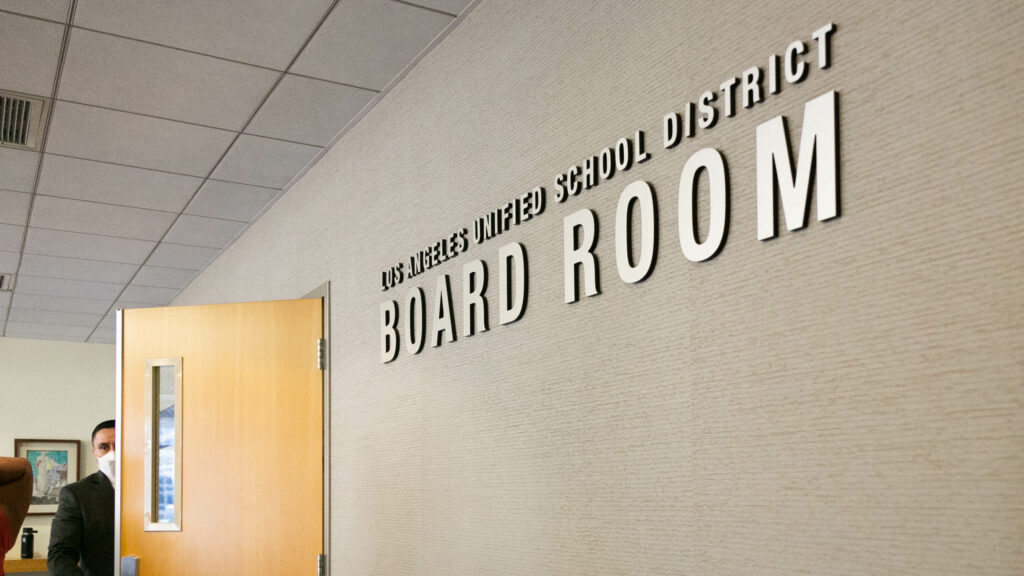
Credit: Julie Leopo/EdSource
As anti-immigrant and anti-LGBTQ+ policies and rhetoric spread across the nation in the wake of President Donald Trump’s re-election, the Los Angeles Unified School District school board affirmed its commitment to members of these communities by unanimously passing four resolutions at Tuesday’s board meeting.
“The district will continue to do everything in its power to protect and defend the kids in our care,” one of the resolutions reads. “Doing so is the responsibility of all LAUSD employees.”
Here’s an overview of LAUSD’s efforts from Tuesday’s regular board meeting and what to expect in the months leading up to Trump’s inauguration.
LAUSD as a sanctuary district
After Trump vowed to declare a national emergency and bring in the U.S. military to facilitate mass deportations, LAUSD passed a resolution reaffirming that it will remain a sanctuary and safe zone for families.
“We survived the pandemic because we stood together,” said Mónica García, who authored the original sanctuary resolution in the 2016-17 academic year and previously served as the President of LAUSD’s school board, at Tuesday’s meeting. “…It is so important that as we may see policies that we do not support….that we stand together in response to the times.”
The board resolution comes roughly eight years after the original effort was passed to make LAUSD a sanctuary; it also requires that Superintendent Alberto Carvalho presents a plan to the board within 60 days so it can be implemented when Trump returns to the White House.
The resolution says Carvalho’s plan should involve training for LAUSD educators, administrators and staff on responding to federal agencies and anybody else who seeks information or attempts to enter a campus.
Meanwhile, the board resolution insists that LAUSD will “aggressively oppose” any laws forcing school districts to work with federal agencies and personnel involved with immigration enforcement.
“The good news is that we have seen it before, and we are in a position to act,” García said at Tuesday’s meeting. “The challenge…[is] there are families who are separated and who are traumatized because of the fear of what is to come. And, we will continue to ask them to come to school and give us their very best.”
She added, “Whether it is two years or it is four years, it is every day that we exercise love and the power of this institution on behalf of children and families.”
A safe place for LGBTQ+ and immigrant communities
The resolution would require LAUSD to add gender identity and expression to the list of groups covered by its “To Enforce the Respectful Treatment of All Persons” policy and require the district to update District Policy Bulletins as needed.
It also calls on the LAUSD to support legislation backing immigrant and LGBTQ+ communities — and to provide educational and mental health resources.
A response to Project 2025
Tuesday’s resolution promises that LAUSD will remain “inclusive, safe, and welcoming” for all communities in the face of any “immediate, incalculable, and irreparable harm” to public schools caused by Project 2025.
It states that LAUSD will defend all students’ right to a public education and protect them from potential harm.
Carvalho will have to report back to the board within 60 days — and present an overview of the potential impacts of Project 2025 as well as a district response, the resolution states.
“This resolution is a bold and necessary shield against the looming threats to public education — a public good that we must protect fiercely and defend,” said board member Rocío Rivas at Tuesday’s meeting.
A new political education course
This resolution emphasizes the importance of turning LAUSD students into critical thinkers, capable of discerning facts from falsehood and ready to participate in the American political system.
“We’re not talking about [being] a Democrat or a Republican,” said Board President Jackie Goldberg, who authored all four resolutions, during her last full board meeting Tuesday. “…It’s about understanding the actual way the government works — as opposed to what the constitution says. And there’s a big difference.”
The board’s resolution specifically asks Carvalho to look into creating a high-level political education course and report back to the board in 160 days.
His considerations, according to the resolution, would include whether the course would serve as a requirement, areas that the curriculum would cover, the types of professional development that would be needed and the ideal grade levels to teach it.
The resolution also asks Carvalho to consider any other curricular changes in the grade levels leading up to the course to make sure students are prepared.
Anely Cortez Lopez, student board member, said at Tuesday’s meeting, “The understanding of the political landscape of the United States is vital in our schools as we continue as the change-makers of tomorrow.”

